Parents of twins stand watch in Ukrainian hospital for months after surrogacy trauma
Desperate Australians are flocking to the Ukraine in increasing numbers to take advantage of the country’s liberal surrogacy laws. But as this couple found out, their dream of parenthood often turns into an expensive nightmare.
QLD News
Don't miss out on the headlines from QLD News. Followed categories will be added to My News.
DESPERATE Australians wanting to have a baby are flocking to the Ukraine in increasing numbers to take advantage of the country’s liberal surrogacy laws.
But their dream of parenthood often turns into an expensive nightmare — stranded in the Eastern European country for months, watching over critically-ill infants in intensive care units and racking up tens of thousands of dollars in medical bills.
One Australian couple, who returned home with twins this week, have revealed how they had to rely on Google translate to keep informed about how their seriously ill children were doing.
A fifth of all Australian surrogate babies are now born in the Ukraine — about 50 in the past year alone.
Opinion: Clear path to surrogacy in Australia
Why I’m having my fifth baby for a stranger
Heartbreaking moment I had to hand a baby over
The country’s overseas surrogacy industry has soared by 1000 per cent in two years, turning it into the baby-making capital of the world.
Australians are being lured there because all rights of the surrogate woman have been stripped away, meaning she cannot change her mind and decide to keep the baby.
Some experts also say that in cases where an egg donor, as well as a surrogate, is required the Ukraine is desirable over Asia because the babies look Anglo-Saxon.
But the relaxed Ukrainian surrogacy laws also carry shocking risks.
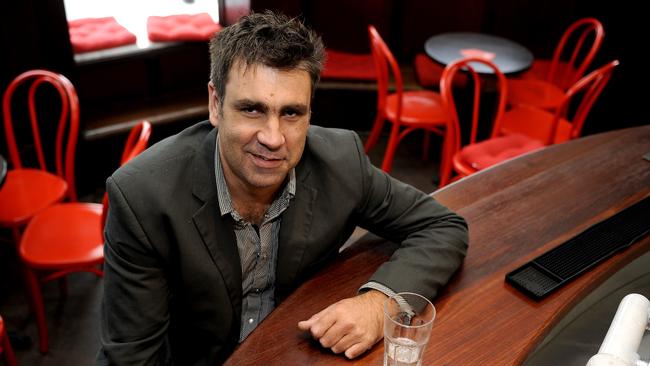
Medics are permitted to transfer double embryos to the baby carrier and Australian surrogacy experts warn this process heightens the risk of obstetric problems and early delivery.
“Since the laws tightened in India and Thailand we are seeing a flood of couples looking to the Ukraine, which caters for heterosexual couples only,” Sam Everingham, president of Surrogacy Australia, told The Sunday Mail.
“But sadly, double embyro transfers are permitted in the Ukraine and that can increase the risk of problems.
“We are hearing of more and more couples who are stuck in the nightmare of babies arriving early in critical conditions and no insurance will cover parents for this kind of unexpected cost.
“We need to do more to keep couples in Australia.”
Australians have become the world’s third biggest users of surrogacy services after China and israel. Close to 300 Australian babies are born to surrogates each year.
At $30,000 to $45,000, Ukrainian surrogacy costs are a quarter of those in countries like the US. But some couples are wearing an extra $20,000 or more for their unexpected overseas relocation and medical expenses.
An Australian community is growing in the Ukraine as couples seek comfort from others facing the same shocking problems. The language barrier and lack of support from agencies leaves many Australians clueless as to the state of their children’s health.
Hospitals direct parents to walk almost 15kms in a day to locate medicines from pharmacies for their children.
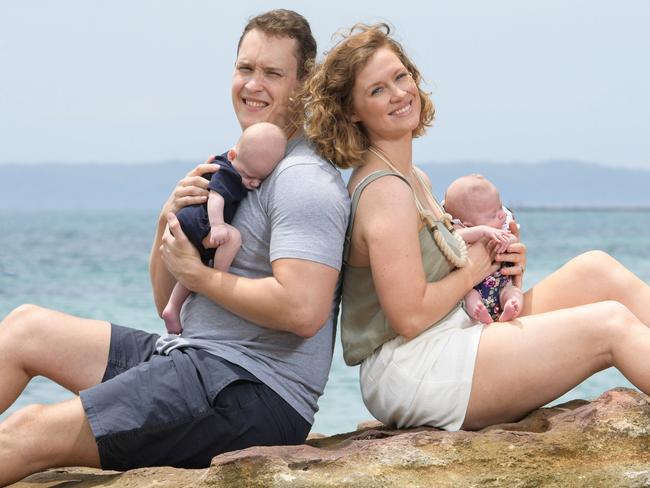
Queenslander Lou Pitcher and her husband Dale have finally got the family they have dreamt of — a beautiful boy Flynn and daughter Ivy.
They were able to bring the tots home this week after months of hell in just one example of how things can go wrong in overseas surrogacy.
The twins were born at 29 weeks with many complications and spent weeks in neonatal intensive.
Ms Pitcher flew to the Ukraine in early October, followed a couple of weeks later by her husband.
Ms Pitcher, a psychologist, and Mr Pitcher, a doctor, closed the door on their lives and work in Australia, and found a place to live in Kiev.
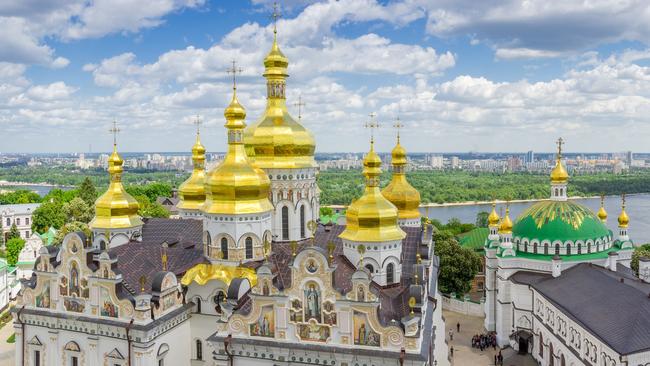
The couple warns others who are desperately hoping to have a family to be careful of “not for profits” providing advice on overseas agencies.
“The agency we used was highly recommended but we were left unsupported and unable to communicate,” she said.
It seemed like a farce when she was forced to use Google translation to find out exactly how ill her children were in the Ukrainian hospital.
“I couldn’t understand exactly what was going on. Both twins had brain bleeds and Flynn had a problem with his lungs and was having seizures. Ivy’s condition was critical. She was born under 1.5kg and had to have surgery to stop the brain bleeds at three weeks old,” Ms Pitcher said.
“When she hit 2.5kgs she had neurosurgery to put a shunt in her brain. The hospital was basic and I was regularly given lists to go and get the babies’ medication. I walked 14km one day to get what they needed.”
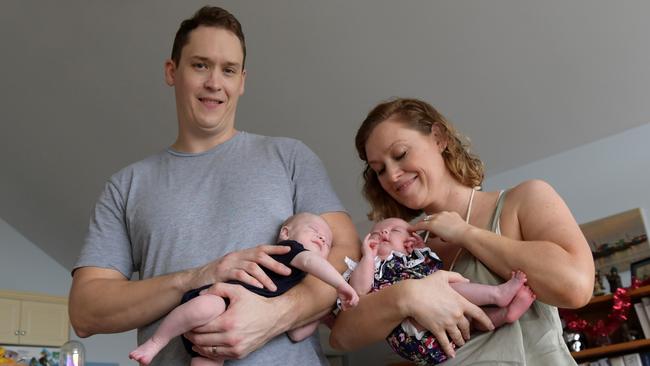
The couple sometimes saw each other for only an hour a day as they had to be so hands- on with their care.
A cancer diagnosis prevents Lou from carrying her own baby.
“We have felt guilt at using an overseas agency and the children being so ill but at the same time the babies are all we ever wanted and we feel so proud of their strength and will to live,” Ms Pitcher said.
Their decision to use a Ukrainian surrogate was based on the country’s legislation.
“In Australia not only is it difficult to find an altruistic surrogate but despite any psychological and legal processes the surrogate can decide to keep the child, which in our case was 100 per cent our DNA. We couldn’t take that risk,” Ms Pitcher said.
Women who are surrogates in the Ukraine consider carrying the baby a job and a valid way to make a living.
“Our surrogate used the money to buy an apartment for her daughter … we were fond of her and she will be in communication with us throughout the children’s lives.”
Ivy and Flynn continue to improve but will have ongoing medical needs when they return home. The family will soon move from Sydney to Brisbane.
A gofundme page has been set up to help the Pitchers with ongoing medical costs https://au.gofundme.com/pitcher-twins
‘LUCKY TO HAVE A GIFT’ FROM FRIEND
SELENA Wool and her husband Nathan understand the soul-destroying yearning that comes when a couple dream of being parents and it’s just not happening.
“I have been one of the lucky ones,” the Capalaba woman says.
Which is not easy to say when you have suffered many pregnancy losses over nearly a decade and spent tens of thousands of dollars on IVF.
Today, Selena and Nathan are parents to two beautiful children — the ultimate gift from Selena’s close friend Kathy Bauer.
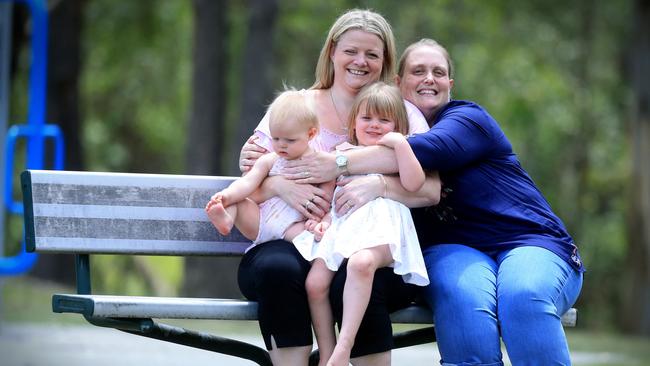
Finding an altruistic surrogate in Australia is a difficult task.
Then there is the fear that the surrogate may opt to keep the baby as Australian law gives the surrogate full rights to the child even if it has 100 per cent the DNA of the intended parents.
“I can sympathise with couples that go through hell to have a baby. I am well aware that my situation is rare,” Mrs Wool said.
“The woman who carried our babies is a much-loved long-time friend and we had 100 per cent trust in each other.
“My children know that Aunty Kathy carried them in her tummy for Mummy. Kathy and her husband Brad and their kids are part of the family.”
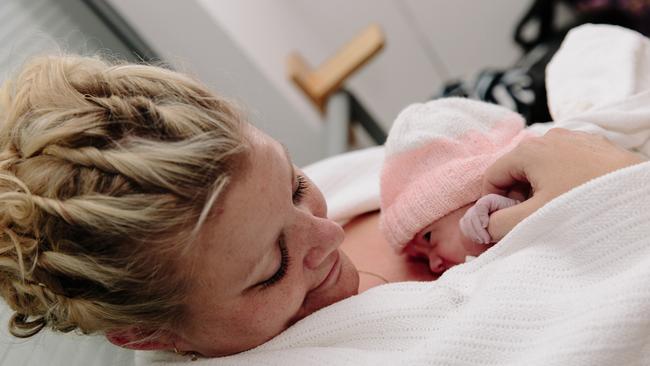
Queensland Fertility Group specialist David Molloysaid in Australia, only the out-of-pocket medical costs are paid to a surrogate.
“It is a big gift to carry a baby for another person,” he said.
The Wools had spent tens of thousands of dollars on IVF before Kathy offered her uterus.
The costs for each baby during surrogacy was over $20,000 but the average costs are usually much more. The Wools already had frozen embryos.
A Medicare Benefits Schedule Taskforce Review last month recommended a surrogacy rebate.


